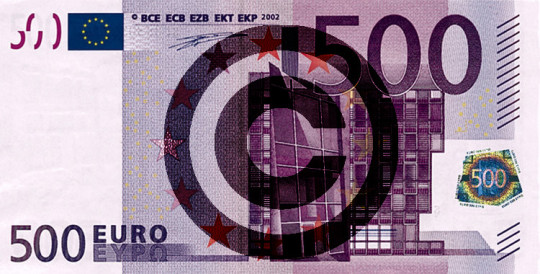The future of Article 13
YouTube’s copyright strikes have become a tool for extortion
Shoshana Wodinsky/The Verge:
An anonymous blackmailer has caught at least two
YouTube creators in a scheme involving cash ransoms and esoteric
copyright laws.Last week, both creators shared stories of how their
channels were being threatened with a third copyright strike — and the
possible termination of their channels — from an anonymous extortionist.
The scammer offered to reverse the strikes in return for payment to a
bitcoin wallet (which, as of this writing, remains empty) or to an adjoining Paypal account (that has since been deleted).“Once we receive our payment, we will cancel both strikes on your channel,” the blackmailer wrote
in a Telegram message to one creator — ObbyRaidz — who runs a small
channel dedicated to Minecraft walkthroughs. “You are free to charge
back if we don’t, but we assure you we will.”“We’ll give you a very short amount of time to make your decision,” they added.
Copyright strikes serve an important purpose for YouTube,
preventing protected material — from pop songs to movie clips — from
being used without authorization. YouTubers served with one or two
strikes automatically have the offending videos deleted, and can also
have certain channel features, like the ability to monetize, restricted
in the long term. Getting those privileges back can take months of work, especially for smaller channels that are often overlooked in favor of their larger or more popular counterparts.Three copyright strikes in a three-month period can take a video down for good. In a short clip
posted to his channel on January 29th, ObbyRaidz described it as
“basically extortion.” “If I don’t pay this dude,” he said, “he’s going
to strike a third one of my videos down.”This isn’t the first time that Youtube’s less-than-perfect copyright system has stabbed creators in the back. The platform’s hands-off approach to moderation has allowed copyright trolls to thrive for years
— not only to extort money, but to doxx, slander, or troll. They can
also be used to suppress negative news; some companies have served comedians with copyright strikes in an attempt to stifle any videos mocking their brand.Troublemakers have also used YouTube’s copyright system to phish or doxx smaller channels. In order to submit a counterclaim, YouTube’s policies
dictate that a creator must provide their personal information to the
channel filing the claim, which can open the door to real-life
harassment.This isn’t the first time we’ve seen extortionists take
advantage of the platform. Similar cases of smaller channels being
conned out of cash through the platform’s strike system have cropped up more than a few times on the site’s help forums. When official channels stall, those forums are often the only recourse victims have.In his video, ObbyRaidz mentions that his attempts to
contact YouTube personnel have all come up short, and any attempts at
repealing the strikes were denied.Those who are able to appeal the strikes don’t have it
much easier. The process, when successful, can take at least a month —
and during that time, “you can’t upload at all,” according to Pierce
Riola, a voice actor whose YouTube channel been hit by similar extortion
scams in the past.Some creators — including Pierce — have reported that YouTube’s algorithm can “punish”
channels that take breaks from uploading for an extended period of
time, relegating them to the back of the feed where their content is
less likely to surface. A smaller channel that’s stuck battling
malicious copyright claims instead of uploading, he added, could suffer
almost as much damage as if the channel was deleted outright.Whatever strikes the extortionist brought on have now
been reversed, according to a series of tweets aimed at ObbyRaidz and
another creator, KenzoOG. “Both strikes are resolved and the videos
reinstated,” YouTube said, in a thread on ObbyRaidz’s twitter account. Reached by The Verge, the company confirmed that the strikes had been resolved.Asked for comment on their policies surrounding this kind
of copyright abuse, a YouTube spokesperson pointed to a prior
statement. “Upon review, these takedown notices were abusive,” it reads.
“We have zero tolerance for the submission of fraudulent legal
requests, so we also terminated the channels that submitted these.”Still, the incident raises real concerns about YouTube’s
ability to respond to copyright blackmail attempts. ObbyRaidz was unable
to flag YouTube’s attention until thousands of retweets and hundreds of Reddit comments
brought attention to the incident. Even channels with more than a
million subscribers have only been able to get the platform’s attention in response to a viral tweet.The biggest problem is the structure of YouTube’s
copyright system, which places most of its scrutiny on the accused
rather than the accuser. As one Reddit user pointed out,
this extortionist was able to carry on an extortion scheme from a
recently created YouTube channel with no videos, made from a throwaway
email address, easy to create and easy to identify as suspicious.The platform works under the good-faith assumption that only users with pilfered content would bother making these claims. The instruction page
for users looking to file claims even warns them not to misuse the
process. “But that’s not the world we live in in 2019,” says Annemarie
Bridy, a Stanford University law professor specializing in copyright.
“It’s a statute from a more innocent, optimistic era in the history of
the Internet.”As Bridy put it, the problem is incentives: YouTube has a
lot more to lose from angry copyright-holders than angry users. Movie
reviewers on the platform who have found their channels bombarded with copyright strikes from
Universal Pictures, for example, after including clips or stills from a
particular Universal film in their reviews. Even after claiming that
these clips were protected as fair use, some found that YouTube
ultimately sided with the company rather than the creators.“It’s the little folks who get lost in the shuffle,” says
Bridy. “That’s a shame, because it’s actually the accumulated little
folks who make YouTube worthwhile.”
